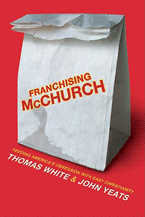|
|

franchising mcchurch
by Matthew J. Pinson
My students at Free Will Baptist Bible College get a big kick out of my love
for Big Macs. Some of them even made a film about it. It all dates back to an illustration I gave in a chapel sermon about how our immersion in pop culture and its superficiality isn’t good for us. I illustrated this principle with Big Macs. I love them, but I have to put severe limits on my intake of them because they’re bad for my health!
So my interest was piqued when I came across a red book with a white (greasy) fast-food bag on the front and the captivating title Franchising McChurch: Feeding Our Obsession with Easy Christianity. In this book, Thomas White and John M. Yeats of Southwestern Baptist Theological Seminary provide readers with a wonderful assessment of the “McDonaldization” of the church.
Marks of McDonaldization
White and Yeats have as their starting point George Ritzer’s famous sociological theory by the same name. It argues that modern life has become dominated by the same principles of mass culture and consumerism that fast-food restaurants operate on. So, the authors say, churches—consciously or unconsciously—are increasingly making themselves over in the image of the corporate world of efficiency and mass production. Like modern secular fast-food chains, they prize efficiency, calculability (numbers), predictability, and control.
The first part of the book discusses those four marks of McDonaldization. The authors convincingly point out that efficiency values processes over people. The church becomes a dispenser of religious goods and services marketed to religious consumers. So, as at McDonald’s, the customer is always right. The church caters to the consumer preferences of attendees, meeting their “felt needs,” which, in reality, detract from real spiritual needs. This often leads to segregation of congregations along the lines of age or consumer preference, niche marketing to appeal to all sorts of end consumers.
The bottom line—numbers, whether head count or money—becomes the driving force. Churches fail to realize that short-term inflation of numbers leads to the long-term lack of spiritual growth and church health. This leaves congregations large but anemic, failing to fulfill the full-orbed purpose of the Great Commission. Finally, to achieve this mass-market vision of success, pastors must exert more control over congregations, becoming CEOs rather than shepherds.
Part two of the book discusses the theological and practical ramifications of McChurch. The authors skillfully point readers back to the New Testament doctrine of the church—the vision of Christ and the apostles for the gathered body of believers. They do this in a way that discusses practical ways forward for pastors and their churches. They discuss pressing by-products of McDonaldization such as “sharing sermons;” replacing worship with entertainment techniques so as to appeal more effectively to consumers; and a move away from the preached Word toward therapeutic talks, drama, and clever illustration techniques where style outweighs substance.
Multi-Site Churches
Worth the price of the book is the authors’ penetrating discussion of the new multi-site or multi-campus church movement, whereby megachurches, not content simply to plant new churches out of their congregation, spawn additional “campuses,” with the preaching provided via satellite from the senior pastor of the “main campus.” These congregations are controlled by the “main” congregation, give all their offerings to the main congregation, et cetera.
Thomas and White even share actual stories of “mergers and acquisitions.” It is now commonplace for megachurches to “acquire” congregations in other neighborhoods—and even other cities and states—to become one of their sites—just as larger corporations gobble up smaller firms.
The authors persuasively argue that this approach diverges from the New Testament model of self-governing local churches to which Baptists and other free-church movements have subscribed for centuries. They are right in saying that, for all intents and purposes, multi-site churches are episcopal dioceses with a centralized bishop that oversees pastors of local churches which have little control over their own church lives but are rather controlled by the diocese.
I would add that, sadly, the episcopal model is superior to the multi-site model. Like the multi-site approach, Episcopal church government removes decision-making authority from the local congregation. But in the episcopal system, each local congregation has its own pastor (shepherd) who feeds the Word to the flock. Multi-site set-ups don’t even have this basic function of the New Testament church.
New Testament Model
The authors correctly emphasize that the multi-site model, like the episcopal approach, differs from the New Testament model of self-governing local congregations of gathered believers. According to this approach, these self-governing flocks call their own pastors who shepherd and feed the flock the Word of God. They call their own deacons, who serve the flock and assist the pastors in the administration of ordinances to the people of God.
These gathered people are a holy priesthood covenanted with each other in the flock’s mission, vision, and government. While they maintain strong ties of accountability and fellowship with sister congregations, they maintain control of their own internal affairs, including their finances and property ownership.
Christians from Baptist and other free-church movements have historically affirmed this biblical vision of church government. Yet, as White and Yeats clearly show, the new multi-site movement is at odds with this biblical-historical model.
This is the first book I’ve read that sizes up the multi-site church movement from the vantage point of a thorough biblical theology of the church. The authors, who have extensive pastoral experience themselves, strive to make the book practical and easy to read for everyday church leaders seeking to build authentic churches in a maelstrom of consumerism, marketing, and entertainment.
Get It. Read It.
While I disagree with a few of the points in the book, its broad thrust is desperately needed in our consumer-driven church world with its temptation to exchange New Testament principles of church health, growth, and replication for marketing, entertainment, big business, and psychotherapy—modern concepts that didn’t even exist prior to the twentieth century.
Franchising McChurch calls churches away from the world’s definition of success. It challenges us to free ourselves from the spirit of the age and tap into the Kingdom and let it transform our world. It is a book that drinks deeply from the well of Scripture and reconnects its readers back to Jesus’s vision of the church and away from the vision of modern corporate visioneers.
If you are a pastor or church leader, I encourage you to read this book. Think deeply about it. Pray about it. Study the scripture passages it discusses. Be self-critical. Be open to change. If you do—even if you don’t agree with everything the authors say—I predict that it will help stimulate growth in your ministry and encourage a truly biblical approach to church life, health, and growth.

About the Writer: Matt Pinson is president of Free Will Baptist Bible College. Order Franchising McChurch from Randall House Publications: 800-877-7030 or www.randallhouse.com.
|
|

